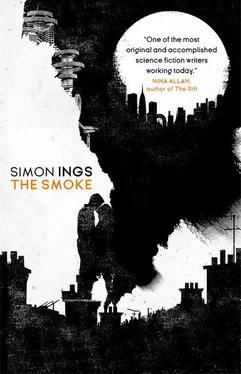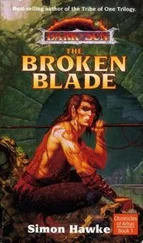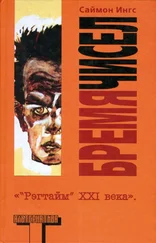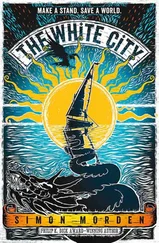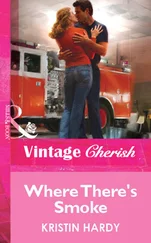This is the price we chickies pay, you see, for looking into other minds. Once we look, we cannot look away. The price for understanding all is that we must forgive all. We don’t have a choice in the matter. Knowing all there is to know about another mind, how could we ever harm it, or wish it ill?
The most we would ever do is steer it to a better place.
Silly boy. Don’t you see? I’m here to help.
* * *
We take carpeted stairs out of the Barbican Centre’s basement levels and exit on a raised brick concourse.
‘I saw you today. Lots of you. All of you. In the Underground.’
—Yes.
‘You were running away.’
—Wouldn’t you, if you could?
‘You’re fleeing the city?’
—Of course.
‘But where can you go? Where are you going? Have you got some kind of… spaceship?’
—Ha! Nothing so fancy. We thought, the Thames Estuary. Serious. The water’s going to be the safest place around here soon.
We come to an escalator leading down to street level. But that’s your route, not mine.
—I go this way.
‘I’m heading up to King’s Cross,’ you say. ‘See if the trains are running.’
It’s not my style to say goodbye. Easier just to turn my back. So I set off, following a line of yellow tape across the bricks of the highwalk. My steps are dainty and precise, as though the tape were a high wire. I follow the line around a corner, and—
* * *
You weave through the length of the prop shop, past the stuff from the first season of DARE . Here are the pilot’s and copilot’s seats for the Moon-based interceptor. On the bridge of DARE’s hunter-killer submarine, a raised ring of metal grilles forms a walkway. Banks of switches and nested pipework and consoles of no obvious utility fill the narrow space. You edge around a table covered with scale-model trees and then a tank of brackish green water. Beyond it there is a door. Open it. Take carpeted stairs out of the Barbican Centre’s basement levels and exit on a raised brick concourse. You will come to an escalator leading down to street level. Leave the Barbican.
It is later than you thought. The Foresters has already stopped serving. You walk by and see bar staff working under cold blue light, cleaning the bar, stacking glasses.
After a couple of minutes, you come to a bus stop that promises a night service to Euston. It will get you most of the way to where you’re going, and this is good, because your feet in those ridiculous boots of yours are aching like a bastard.
You have already quite forgotten my existence, and in my place I shall put memories of the house you shared in Tooting, before you ever moved to the Barbican. Do you remember, two of your housemates had a stand-up act? They dressed as pirates. Their routine changed constantly but it never got any better. A warm sense of comradeship fills you, and memories of laughter, and faces you have not thought about for a long time, and how Fel visited and stayed with you sometimes, and how impossible it was to fall asleep together in that narrow bed of yours, and how it never mattered.
The bus arrives. It’s late, and very full. You’ll have to stand. The pole you hang from is cold against your forehead. You take deep breaths, trying to wake yourself. You’re going to have to fill up on coffee as soon as you can, for there’ll be no chance for you to sleep till you’re on the train back north. At King’s Cross, call Bob’s usual pub and try and get through to him. It won’t be easy, persuading him to flee his home. It’s going to take more than one phone call. But you have to start somewhere.
The main thing is not to panic. You have all tomorrow to get home and begin the work. If you’re lucky, and the milk train is running, then you’ll be home by early afternoon. But even if you have to wait for the first regular train, that still gives you the evening with your dad, and by then there ought to be enough corroborating news on the radio to convince him to flee with you.
There’s no telling the power of the coming impacts, and with more information, more people will be on the move. So if I were you, I would not delay. Get him moving that very night. Get far into the moors by morning, well up among the hills towards Walshaw, where there are (so far as you and I ever saw) no munitions, no radar arrays, no heavy industry, nothing for the Bund to target. Just sheep paths and peat and the wind blowing through meadows of sere grass and peat bogs you could lose a dog in, and subtle circles of long-since-vanished habitation.
You’ll be glad of your sturdy boots by then.
But what if, after all your efforts, Bob will not be persuaded to leave? He may be too sceptical or too proud to abandon his station now that war is coming. All his life he has slogged out his weeks for hardly more than the promise of a weekend. Were all that to become suddenly meaningful – war work! The nation expecting! – it might tempt him to stay.
In that case: my last advice, before I let you go. Sweet boy. My darling unaccommodated man.
Stay with him. Stay by your father’s side and watch the skies for daytime stars.
When they hit, the ground will heave. Stand by him. The sky will fill with earth and leaves and the cries of men and bits of skin and foil and feathers. Hold fast, and take his arm.
The factory floor rises, the belts clatter and grow deranged, they flap uselessly, and soap and oil slop about the floor, and at last the great machines themselves, the lathes, topple and fall.
You may stagger. Your father may fall. But if he falls, you take him into your arms. Are you listening to me? Draw him up. He’s dazed, his world is ending. But not yet. You turn and bend and reaching back you snare the old man’s knees within the crooks of your elbows, and falling forward, your father wraps his arms around your neck, and so you’ll rise, lifting him, and leaning forwards, staggering at first, but you’ll find your pace. You run for the exit, past blazing pools of oil and burning men, upended tea trollies and clocks everywhere, crashing off the walls, and out into the yard, where pipes are rolling back and forth across the brick-paved yard, colliding with men and crushing them. Pause. Observe. Bide your time. Then run, your father on your back, and—
* * *
—waking again, your forehead pressed to that cold steel pole, the bus rattling along now, making up for lost time on the wide, empty streets of Islington, I wondered where this plan of mine had sprung from.
* * *
—Do you remember the flat in the Barbican, your bed, and the cool of the sheets in the night?
* * *
Yes, I remember.
I remember waking suddenly in the middle of the night, convinced that there was a strange presence in the room. But the room was not dark, there was a light on, and I turned over in the bed, and there was Fel, sitting up on pillows, the reading lamp on, poring over an old book. And when she saw that I was awake and felt me move against her, she grinned, the jewel shining in her tooth, and lifted the book for me to see – Mum’s Aeneid – and said, ‘The old stories are the best.’
Thanks go to my agent Peter Tallack, and to my editors Simon Spanton and Rachel Winterbottom.
The workings of the HMS Victory are loosely based on designs developed at General Atomics during the late 1950s, discussed in George Dyson’s Project Orion: The True Story of the Atomic Spaceship (Henry Holt & Co, 2002).
DARE is a loose homage to UFO , a TV series created by Gerry and Sylvia Anderson which ran from 1970 to 1973.
SET is a registered trademark of Cannei, LLC. SET cards © 1988 Cannei, LLC. All rights reserved.
Читать дальше
